The genius of the maneuver who beat Napoleon
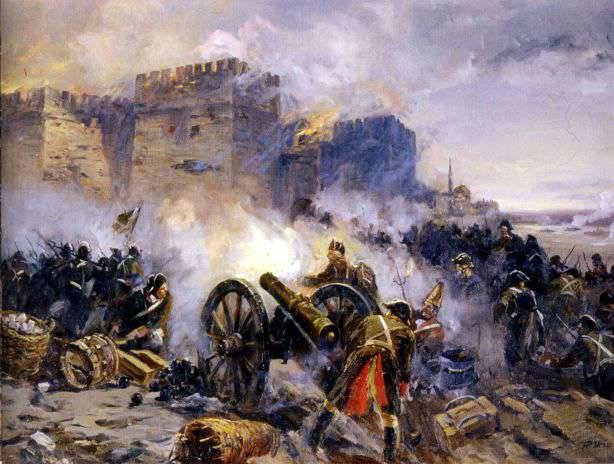
Maneuver as one of the most important factors in achieving success in combat is of paramount importance in the art of war. From the most ancient times, the warring armies used it both on the battlefield (tactical) and on the scale of the entire theater of operations (strategic), with the aim of transferring troops to the right direction, withdrawing them from the enemy strike or creating the required group of forces and forces. classes more advantageous position. The role of maneuver increased with the improvement of the means of warfare, the growth of the number and mobility of troops.
We consider the implementation of a major maneuver in the Russian army at the end of the XVIII - beginning of the XIX century in the commanding activity of M.I. Kutuzov. He made extensive use of maneuver in various forms (a retreat and offensive march-maneuver, flanking, embracing and bypass) and made him the key to all his famous victories.
Well aware that victory was ultimately achieved by combat, he sought, with the help of a maneuver, to take the fight or impose it on the enemy in the most favorable conditions for the Russian army. For Kutuzov, one of the main goals of the maneuver was to strive to save his troops and achieve victory with little blood. "For ten French I will not give up one Russian," was the motto of the great commander.
All the hostilities in which Kutuzov led the Russian troops are imbued with the idea of maneuver. This is explained by the fact that the commander had to take command, as a rule, in the most unfavorable, and sometimes even critical for the army conditions, with an unprofitable balance of forces for the Russians. Therefore, he was forced to start fighting with a maneuver that was designed to withdraw his troops from the blow, gather all his forces into a fist and achieve a change in the situation in our favor and go on the offensive.
In the 1805 campaign of the year, the Russian commander, hurrying with the 50-thousandth army to help the Austrian troops to Ulm, unexpectedly, in 1000 km from the Russian border, appeared before Napoleon's 150-thousandth army. The latter, having foreshadowed the formation of the armies of his opponents, with the help of a swift, offensive march-maneuver surrounded the Austrian troops under Ulm and on October 7 forced them to surrender. True to his principle of beating the enemy piecemeal, Napoleon decided by the same method and just as quickly end the Russian army, which at that time was still concentrating in Braunau. However, here he faced a worthy opponent. Having guessed the plan of the French commander, Kutuzov opposed him to an offensive march-maneuver, which aimed to surround the Russian army, an even more skillful retreat march-maneuver and brought the Russian troops out of the way. When the French 17 October entered Braunau, the Russian army was no longer there. Napoleon’s hopes of a quick victory over the Russians did not materialize.
Kutuzov’s plan was to avoid a general battle under unfavorable conditions, to withdraw his army to Tsnaym, then to Olmuts, to meet the Buxgewden army advanced from Russia and the Allied Austrian troops, and then, when all forces were gathered into a fist, go to offensive and defeat the French.
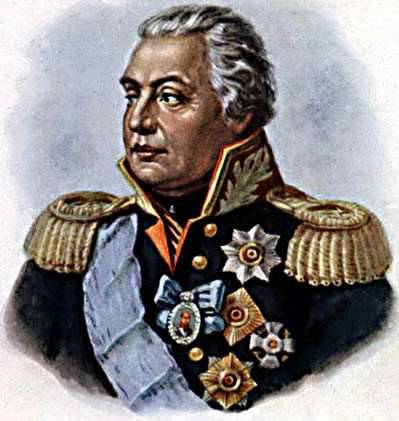
Kutuzov’s masterful maneuver preempted all Napoleon’s attempts to cut off the retreat from the Russian army and avoided encirclement. After several unsuccessful attempts to bypass the Russian troops and press them to the Danube on the right bank, Napoleon transferred Mortier’s corps to the opposite bank to block the path of our army to Tsnaym. Kutuzov, in the battle of Amstetten, threw away the troops of Murat, who were pursuing him along the right bank, quickly sent the entire army across the Danube and destroyed the bridge behind him. After that, using favorable conditions, Kutuzov moved his army towards the troops of Mortier and in the battle at Krems on October 30 utterly defeated the French corps. Napoleon, being on the other side of the Danube, was forced to be content with the role of an impotent witness of the “Kremnaya carnage” (as he called it his defeat), while Kutuzov continued to withdraw the army through Crem to Tsnaym.
Never defeated, Napoleon made a new decisive maneuver to surround the Russian army. On the move, overcoming the resistance of the Austrians, he quickly advanced troops to Vienna, captured it, and there sent the entire army across the Danube, so that the main forces would again block the way for the Russians to Tsnaym.
But Kutuzov and this time in a timely manner revealed the enemy’s maneuver and answered with a counter-maneuver. He advanced to meet the French, to Schöngraben, the 6-thousand-strong detachment of Bagration, who had fought with the entire French army for almost a day and had restrained its onslaught. Having forewarned the French in a maneuver at Znaim, Kutuzov withdrew his troops through this point to Olmutsu, and thereby completely disrupted Napoleon’s plans for their encirclement.
As a result of the 400-kilometer march maneuver from Braunau to Olmutsu, the Russian commander achieved a change in the strategic situation. In Olmuts, his army united with the approached reserves, after which its number increased to 86 thousand people. 80 thousand Austrian troops from Italy were expected. In addition, Kutuzov forced the enemy to stretch his forces during the offensive march, as a result of which Napoleon managed to bring all 60 thousand people to Olmuts. This was the result of the "masterful movements" of Kutuzov. Kutuzov surpassed his illustrious adversary in the art of maneuver.
The great Russian commander failed to fully implement the planned campaign plan and realize the strategic advantages achieved by the march-maneuver for defeating the French. The emperor Alexander I, who had arrived in the army and was pushed by the allies, sent troops to die in the Austerlitz battle, which was prematurely and ineptly conducted according to the Austrian plan.
On the other hand, Kutuzov’s maneuver against the Turkish army under Rushchuk in 1811 ended in a completely different way, when he managed to maintain his independence in command before the end. As in 1805, Kutuzov received an army in a very difficult situation for her. Against 80 thousand Turkish troops, whose main forces (60 thousand) were hiding in the strong fortress of Shumla, he had only 46 thousand. Russian troops were stretched along the Danube on the 1000-kilometer front. At the same time, Alexander I, having appointed Kutuzov as commander-in-chief of the Danube (Moldavian) army in 1811, demanded that he achieve a quick and decisive victory in the war with Turkey, which none of his predecessors, who had twice their strength, could accomplish over the years. In carrying out such a difficult task, Kutuzov again relied on the maneuver. But, unlike 5, when his actions were forced, he used the opponent's passivity and immediately took the initiative in his hands. This difficult and then very few people understandable maneuvering combined with military cunning from the very beginning was imbued with the idea of an offensive.
Kutuzov first of all decided to lure the Turkish troops from Shumla and draw them into battle in the open country. Leaving the fortresses captured earlier by the Russian troops and gathering his few forces into a fist, he took up a position on the southern bank of the Danube under the Rushchuk fortress, deploying his troops to the rear of the river.
As Mikhail Illarionovich suggested, the commander of the Turkish army could not resist the seductive prospect of pressing the small Russian army to the Danube and destroying it. But everything turned out quite differently. In the battle under the walls of Ruschuka, where 15 thousands of Russian soldiers came together against 60 thousands of Turks, the Ottoman army was defeated on June 22. Kutuzov's plan was justified. However, the Russian commander went even further in his military tricks. He did not pursue the Turkish army that had fled, and did not lead his troops to Shumla, but unexpectedly for all he ordered to blow up the fortifications of Ruschuka and sent his troops to the Danube. Kutuzov explained his unexpected maneuver to the bewildered officers as follows. If the Russian army rushes after the Turks, then it will probably reach the walls of Šumly, but it will be problematic to take it. We'll have to go back, as it did last year. This will enable the Turkish Vizier to declare himself the winner. It is much better to encourage "my friend Ahmed Pasha, and he will come to us again."
That is exactly what happened. The Turkish vizier considered himself the winner of the Ruschuksky battle, quickly strengthened his army to 70 thousand people and rushed after the Russians beyond the Danube. Part of the army in the number of 20 thousand soldiers Ahmed Pasha left on the right bank under Ruschuk, to ensure the rear.
Kutuzov, having achieved a favorable situation for himself, immediately moved from defense to decisive offensive actions. A broad roundabout maneuver with the crossing of the Danube, the Russian troops of the part of the forces (Markov's detachment) went to the rear of the Turkish army and cut off its escape route to the right bank. At the same time, the main forces of Kutuzov attacked the Turks from the front and the flanks on the left bank and pressed them against the Danube. The Turkish army was completely blocked. Using his brilliant victory and outstanding diplomatic skills, the Russian commander forced Turkey, an ally of France, to sign peace before Napoleon’s invasion of Russia. The decisive role in this victory was played by subtly conceived and consistently carried out maneuvering, which Kutuzov imposed on the enemy the desired actions.
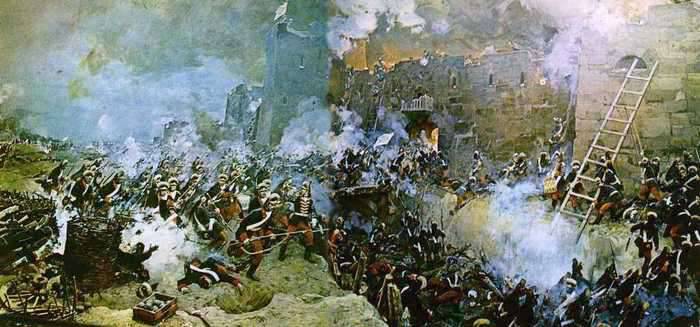
With particular fullness and strength, his talent was revealed in the Patriotic War 1812 of the year, during which the Russian commander reached the top of his military glory and enriched the art of war with new forms of maneuver that had not been used before. During the general battle in the Borodino field, Kutuzov, inflicting irreplaceable damage to the enemy and seriously undermining his strength, did not risk his army in a new battle on the outskirts of Moscow, which was to become as bloody as Borodino. He decided to achieve a final change in the course of the war and the subsequent complete defeat of the French army with the help of a tried and tested means - maneuver, alternating with private battles and battles. Acting in this way, Kutuzov wanted to exclude all chance and win with less losses.
In order to achieve this goal, the great commander, who was deeply aware of his responsibility for the fate of Russia, sacrificed Moscow in order to “prepare Moscow for the enemy the inevitable death ...” Such a sacrifice was necessary to implement the ingenious Tarutino maneuver that Kutuzov had planned over Russia in mastering its capital.
On the night of August 27, the Russian army secretly left the Borodino field behind the enemy, passed through the capital, and began to retreat further along the Ryazan road. But it was not the usual retreat march maneuver, similar to that used against Napoleon in the 1805 year. On the second crossing, the main forces of the army suddenly turned to the west and, hiding behind the right p. Pakhra, carried out a flank march towards the French towards Podolsk and further to Red Pakhra. In the interests of secrecy, Kutuzov did not devote even his own headquarters to his plans. At the same time, in order to deceive the enemy, he ordered the rear guard of the Cossacks to continue withdrawing towards Ryazan, with the result that Napoleon “lost” the Russian army. She, having completed her maneuver, went out onto the Kaluga road and got up near the village of Tarutino.
Reporting to the Tsar about the goal of the Tarutinsky maneuver, Kutuzov wrote: “... I hope to force Napoleon to leave Moscow and change his entire operational line ...” The commander really achieved this. Brilliant in his conception and execution of the Tarutinsky maneuver, he at once changed the entire strategic situation in favor of the Russians. Napoleon himself later admitted: "Kutuzov let me down strongly by his flank march."
The Tarutin maneuver brought the Russian army out of the enemy’s strike, and now it itself occupied a flanking position threatening it, having gained the opportunity to influence its communications between Moscow and Smolensk. She gained freedom of maneuver and deprived of such Napoleon, having stood in the way of the French army in the southern regions of Russia, not yet ravaged by war. Mikhail Illarionovich covered not only Kaluga, where the necessary supplies for the Russian army were located, but also Tula with its powerful weapons factories. He kept in his hands the means of communication with the southern regions of the country, due to which the army was replenished and supplied. In addition, the necessary conditions were created to prepare our army for a counterattack. Ultimately, this maneuver had decisive consequences for the entire campaign of 1812.
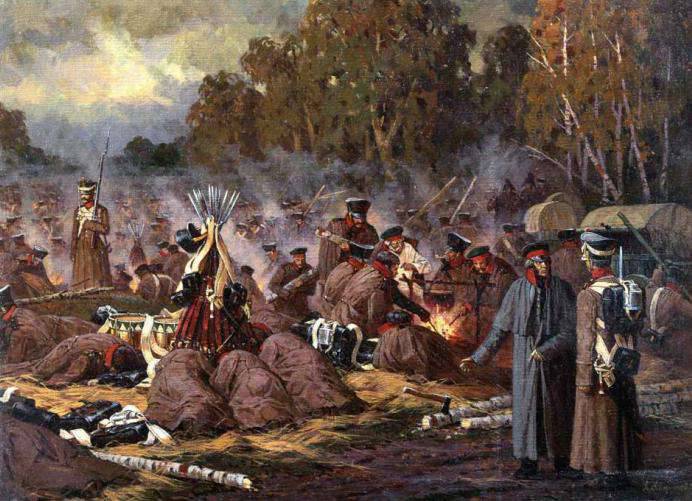
As expected Kutuzov, the French were forced to leave Moscow. To save the day, Napoleon tried to break through to Kaluga through Maloyaroslavets. However, Kutuzov responded with a counter-maneuver and, winning the battle at Maloyaroslavets on October 12, forced Bonaparte to retreat. A new attempt to bypass the Russian army to the west, through Meren, was also thwarted by Kutuzov’s counter-maneuver. He quickly moved his troops to Detchino and the Linen Factory and again blocked the enemy's way south.
The maneuver of the Russian army to Maloyaroslavets, Detchin and Polotnyannyi Zavod cost the won general battle. By these actions, Kutuzov finally secured a strategic initiative for himself, forced Napoleon to recognize himself as defeated and retreat along the hungry Smolensk road ravaged by war. According to a participant in those events of the French General Segur, “the conquest of the world stopped here ... twenty years of continuous victories crumbled into dust.”
The offensive march-maneuver of Kutuzov during the counteroffensive of the Russian army from Maloyaroslavets to the r. Berezina, made by him, as he himself said, in the form of parallel pursuit of the enemy. In this case, it was not about the usual pursuit of an army already defeated on the battlefield in order to complete its defeat. Kutuzov was faced with a completely new task - to defeat, by parallel pursuit, the still quite strong and fully combat-ready 100-thousandth French army. And he is the first in the military stories brilliantly developed and implemented this maneuver. Napoleon’s attempt to use a similar method of action against Kutuzov’s army in 1805, as we know, suffered a complete failure.
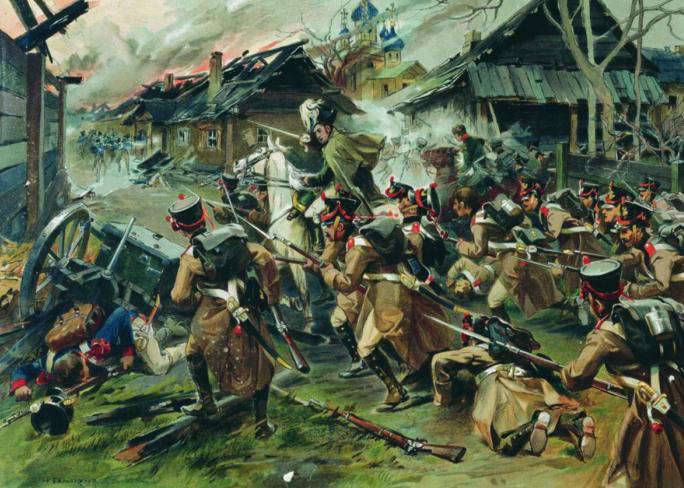
During the pursuit, Kutuzov advanced his main forces south of the Smolensk road parallel to the retreating army of Napoleon, and, constantly threatening to step forward and stand in the way of his withdrawal, he forced the enemy to a non-stop retreat, turning him to flight. Part of the Russian forces - the corps of Miloradovich and Platov - relentlessly pursued the enemy on the heels. At the same time, Kutuzov did not miss a single opportunity, under favorable conditions, to inflict short strikes from the flanks and rear, stretching on the march of the French army, in order to destroy it in pieces. For this, for the first time he widely used mobile units of cavalry and partisan detachments. His main task Kutuzov believed the complete destruction of the army of conquerors. Under Vyazma and Red, Kutuzov drew some of his main forces to defeat the enemy. Having stood in his way, the Russians only in these two battles destroyed and captured more than 40 thousand French soldiers and officers and beat off all the artillery from them, losing only about 4 thousand people.
As a result of the offensive march-maneuver, the Russian army on the way from Maloyaroslavets to Berezina, in essence, destroyed Napoleon’s army as a combat-ready force. Berezina reached no more than 40 thousand people from the once "great army". At the final stage of the 1812 war of the year, Kutuzov undertook the most complicated maneuver at the theater of operations before anyone — a simultaneous attack on the converging directions to Borisov of three Russian armies hundreds of kilometers apart from each other, with the aim of encircling and destroying the remnants of Napoleon’s army R. Berezina.
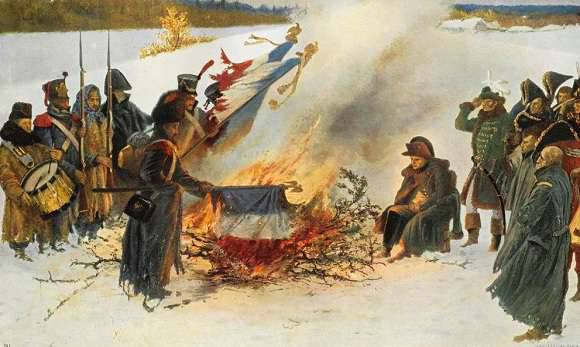
This last in the 1812 war of the year Kutuzov’s strategic maneuver by several armies to solve a single task carried elements of an operation. Its application opened up new opportunities for strategy and was a major contribution to the development of military art. Broad strategic maneuvers are characteristic of Kutuzov’s actions when the Russian army deployed an offensive outside of Russia in 1813. They again showed the desire of the commander to combine the efforts of several armies to achieve one main goal.
As a result of Kutuzov’s maneuvers by mid-April, 1813 of the year concentrated all his forces on the Dresden bridgehead, totaling up to 92 thousand people with 656 guns. The sudden death of the great commander interrupted his vigorous activity aimed at completing the defeat of Napoleon and the liberation of Europe. Owning all the methods and forms of the armed struggle of the time, MI Kutuzov attached special importance to maneuver, turning it into the same means of achieving victory, like a battle. At the heart of its most difficult, often risky maneuvers was the high combat capability of the Russian army.
Sources:
Solovyov E. Kutuzov. The winner is Napoleon. M .: Publishing House "Thomas", 2012. C.3-23.
Lobov V. Military trick. M .: Moscow Military Historical Society; Logos, 2001. C. 58-70.
Ivanov V. The Art of Maneuvering in Leadership Activity // VIZH. 1981. No.3.
Tarle E. Mikhail Ill. Kutuzov - commander and diplomat. Rostov on Don: Phoenix, 1994. C. 477-558.
Shishov A. Kutuzov (Golenishchev-Kutuzov) Mikhail Illarionovich // One Hundred Great Commanders. M .: Veche, 2000. C. 333-340.
- Technical engineer
- [B]Suddenness in the tactics of Suvorov
Special tactics of Admiral Chichagov
Genius resolute offensive strategy
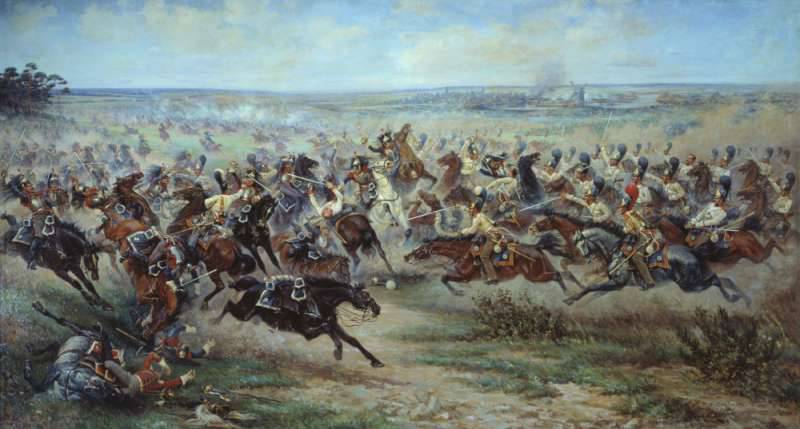
Information